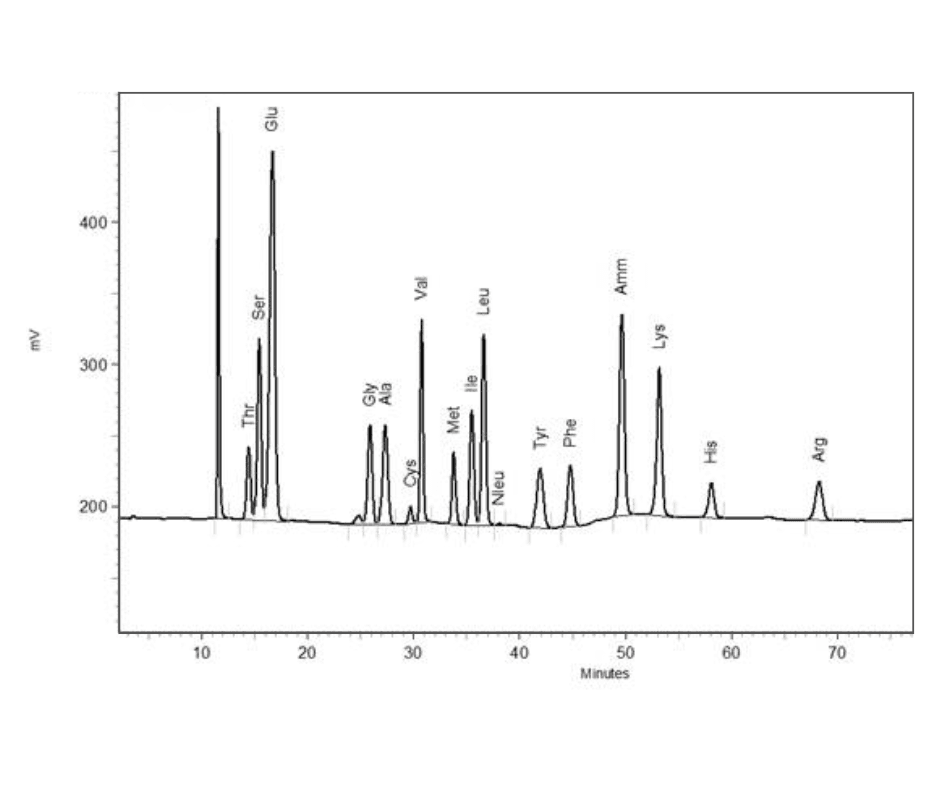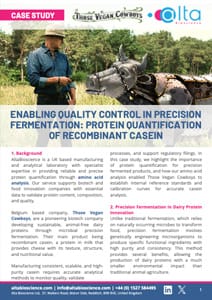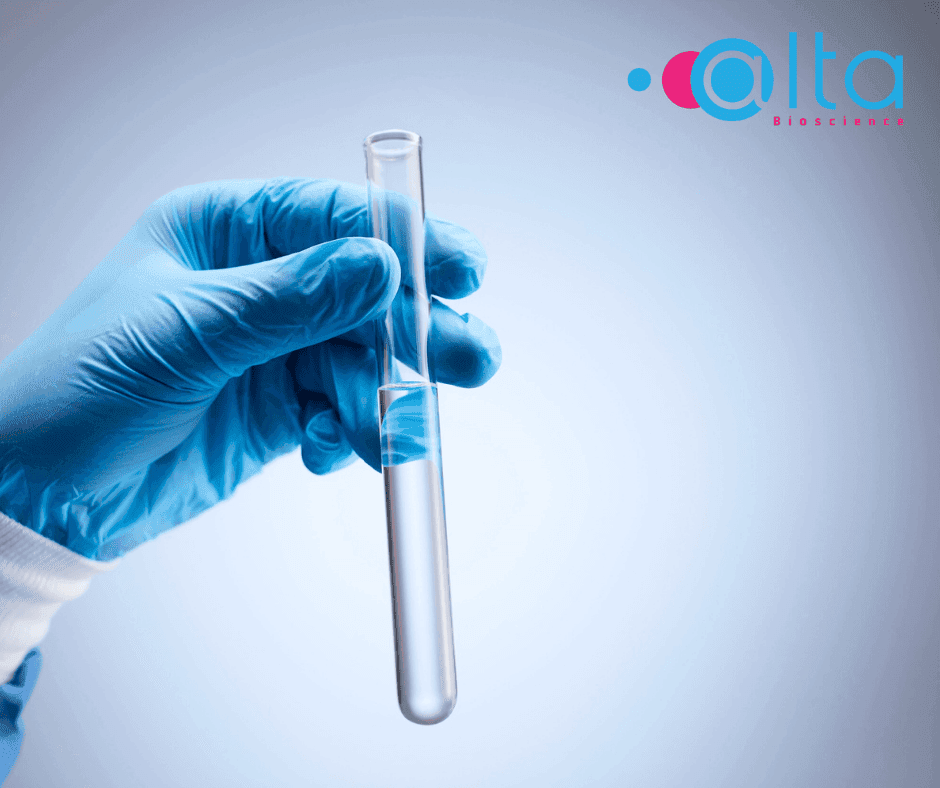Enabling Quality Control in Precision Fermentation: Protein Quantification of Recombinant Casein
Background
AltaBioscience is a UK-based manufacturing and analytical laboratory with specialist expertise in providing reliable and precise protein quantification through amino acid analysis. Our service supports biotech and food innovation companies with essential data to validate protein content, composition, and quality.
Belgium-based company, Those Vegan Cowboys, are a pioneering biotech company developing sustainable, animal-free dairy proteins through microbial precision fermentation. Their main product is recombinant casein, a protein in milk that provides cheese with its texture, structure, and nutritional value.
Manufacturing consistent, scalable, and high-purity casein requires accurate analytical methods to monitor quality, validate processes, and support regulatory filings. In this case study, we highlight the importance of protein quantification for precision fermented products, and how our amino acid analysis enabled Those Vegan Cowboys to establish internal reference standards and calibration curves for accurate casein analysis.
Precision Fermentation in Dairy Protein Innovation
Unlike traditional fermentation, which relies on naturally occurring microbes to transform food, precision fermentation involves genetically engineering microorganisms to produce specific functional ingredients with high purity and consistency. This method provides several benefits, allowing the production of dairy proteins with a much smaller environmental impact than traditional animal agriculture.
Turning this concept into a viable production process involves several key stages. First, the technology begins at the lab scale, where microbial strains are engineered to express specific casein genes. These strains are then cultivated in controlled fermentation systems, where they produce the protein as they grow. Once expression is optimised, the process is scaled up into larger fermentation tanks for large-scale production. Following fermentation, casein proteins are harvested, purified, and prepared for use in dairy alternative products such as vegan cheese.
Those Vegan Cowboys’ challenge: Establishing a Reliable Casein Standard for Quantification
At each stage, from strain development to scale-up, accurate protein quantification is essential to monitor yields, assess batch consistency, and support downstream product purification and formulation. To develop their in-house HPLC-based method for quantifying recombinant casein, Those Vegan Cowboys required reliable reference casein samples.
Commercial casein is typically extracted from cow’s milk. High purity references are available but contain a natural mixture of casein types, mainly αs1-, αs2-, β-, and κ-casein. The exact ratio of these caseins, and their degree of post-translational modifications (such as phosphorylation), can vary depending on the source, breed, and processing method. Some companies provide purified powders which are enriched in one of the casein types but still contain a significant amount of the other caseins.
In contrast, recombinant casein produced via precision fermentation may have different casein ratios or may be engineered to contain only specific types and offer significantly higher purity. For assay development, particularly when accuracy and reproducibility are critical, using the recombinant casein itself as the reference standard is more appropriate, as it ensures alignment between the standard and the analyte being measured. However, to be used as a true reference standard, those Vegan Cowboys required the material to be precisely quantified using a robust and accurate method.
Casein quantification by Amino Acid Analysis
Amino acid analysis is widely regarded as the gold standard for protein quantification, especially for novel alternative protein sources. Unlike nitrogen-based techniques such as Kjeldahl or Dumas, which can misrepresent true protein levels due to non-protein nitrogen or atypical amino acid profiles, amino acid analysis delivers a direct and reliable measure of protein content.
AltaBioscience’s specialised team carried out amino acid analysis on multiple highly pure recombinant casein batches produced by Those Vegan Cowboys, using their precision fermentation techniques. With decades of expertise in analysing alternative dairy products and protein quantification from precision fermentation processes, our ISO/IEC 17025:2017 accredited methodologies accurately determined the net protein content of each sample.
Following acid hydrolysis of the recombinant casein samples, the amino acids were separated by ion exchange chromatography before being derivatised by ninhydrin before detection. This enabled:
- Quantitative determination of individual amino acid content
- Net protein calculation based on total amino acid yield
- Clear, traceable data suitable for method development and validation

Outcome
The output of the analysis enabled Those Vegan Cowboys to:
- Create internal casein reference standards with verified amino acid composition and accurate protein content
- Validate their in-house protein quantification assays
- Build a strong analytical foundation to support future regulatory submissions
By using their own precision-fermented casein as a reference standard, they ensured that the matrix, protein structure, and amino acid composition of the standard closely matched their test samples. This led to improved analytical consistency and the successful validation of their internal assay, a crucial initial step in preparing them for future regulatory requirements.
Conclusion
Through our ISO/IEC 17025:2017 accredited amino acid analysis, we were able to support Those Vegan Cowboys in establishing robust protein quantification methods for their precision fermented casein. By delivering precise, traceable amino acid data, we enabled the development of internal reference standards to ensure assay reliability, product consistency, and regulatory readiness.
This collaboration highlights the vital role of amino acid analysis in advancing precision fermentation, where conventional protein quantification methods often fall short.
“As specialists in analytical services for alternative proteins, we are proud to contribute to technologies driving sustainability and reshaping the future of food, directly supporting innovation in animal-free dairy products such as this”, said Sarah Hawker, Head of Amino Acid Analysis at AltaBioscience.
With a strong commitment to scientific excellence and collaborative problem-solving, AltaBioscience remains a trusted analytical partner to companies at the forefront of synthetic biology and precision fermentation. Contact info@altabioscience.com to find out more.
Download PDF




